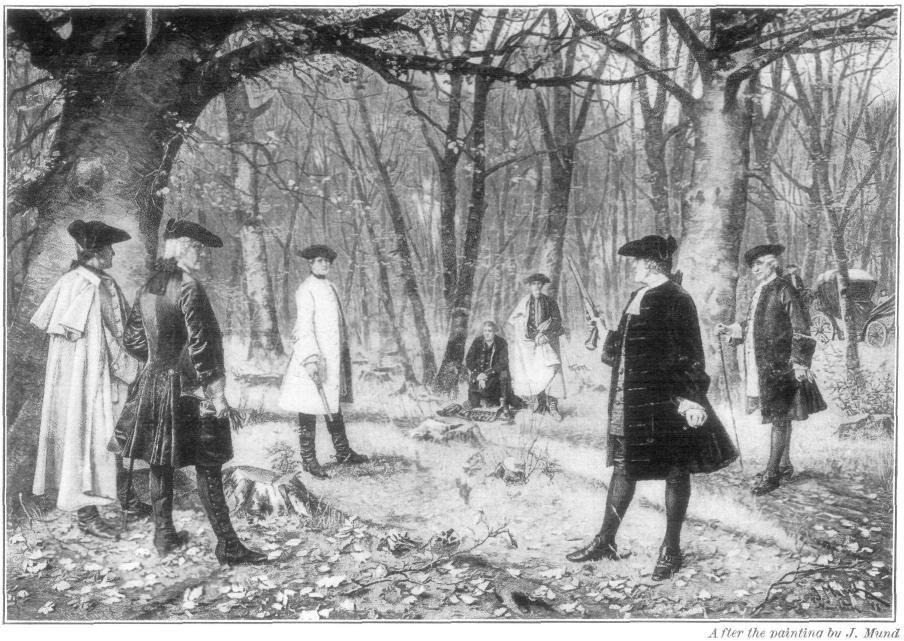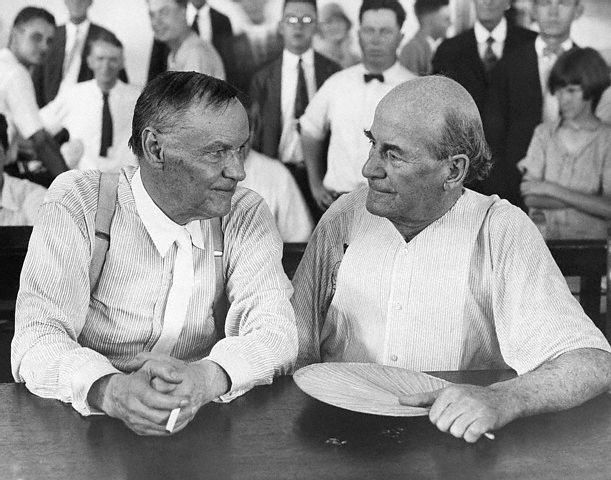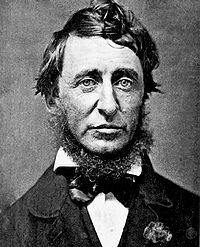Henry David Thoreau (born David Henry Thoreau; July 12, 1817 – May 6, 1862) was an American author, poet, abolitionist, naturalist, tax resister, development critic, surveyor, historian, philosopher, and leading transcendentalist. He is best known for his book Walden, a reflection upon simple living in natural surroundings, and his essay, Civil Disobedience, an argument for individual resistance to civil government in moral opposition to an unjust state.
Thoreau’s books, articles, essays, journals, and poetry total over 20 volumes. Among his lasting contributions were his writings on natural history and philosophy, where he anticipated the methods and findings of ecology and environmental history, two sources of modern day environmentalism. His literary style interweaves close natural observation, personal experience, pointed rhetoric, symbolic meanings, and historical lore; while displaying a poetic sensibility, philosophical austerity, and “Yankee” love of practical detail. He was also deeply interested in the idea of survival in the face of hostile elements, historical change, and natural decay; at the same time imploring one to abandon waste and illusion in order to discover life’s true essential needs.
He was a lifelong abolitionist, delivering lectures that attacked the Fugitive Slave Law while praising the writings of Wendell Phillips and defending abolitionist John Brown. Thoreau’s philosophy of civil disobedience influenced the political thoughts and actions of such later figures as Leo Tolstoy, Mahatma Gandhi, and Martin Luther King, Jr.
Thoreau is sometimes cited as an individualist anarchist. Though Civil Disobedience calls for improving rather than abolishing government – “I ask for, not at once no government, but at once a better government” the direction of this improvement aims at anarchism: “‘That government is best which governs not at all;’ and when men are prepared for it, that will be the kind of government which they will have.”
Tag: Open Thread
Jul 12 2010
On This Day in History: July 12
Jul 11 2010
On This Day in History: July 11
Aaron Burr slays Alexander Hamilton in a Duel
 On this day in 1804, Aaron Burr, Vice President of the United States slays Alexander Hamilton, former Secretary of the Treasury, in a duel in Weehauken, NJ. There are accounts that Hamilton, who had been involved in several other duels that had been settled without shots, decided at the last minute that the duel was immoral and fired his weapon in the air. Burr, whose seconds said that Hamilton did indeed fire at Burr and missed, shot Hamilton in the abdomen. The bullet lodged near Hamilton’s spine, and he was taken back to New York City where he died the next day.
On this day in 1804, Aaron Burr, Vice President of the United States slays Alexander Hamilton, former Secretary of the Treasury, in a duel in Weehauken, NJ. There are accounts that Hamilton, who had been involved in several other duels that had been settled without shots, decided at the last minute that the duel was immoral and fired his weapon in the air. Burr, whose seconds said that Hamilton did indeed fire at Burr and missed, shot Hamilton in the abdomen. The bullet lodged near Hamilton’s spine, and he was taken back to New York City where he died the next day.
The irony is that this was the same place that Hamilton’s son, Philip, had died two and a half years prior defending his father’s honor.
Few affairs of honor actually resulted in deaths, and the nation was outraged by the killing of a man as eminent as Alexander Hamilton. Charged with murder in New York and New Jersey, Burr, still vice president, returned to Washington, D.C., where he finished his term immune from prosecution.
In 1805, Burr, thoroughly discredited, concocted a plot with James Wilkinson, commander-in-chief of the U.S. Army, to seize the Louisiana Territory and establish an independent empire, which Burr, presumably, would lead. He contacted the British government and unsuccessfully pleaded for assistance in the scheme. Later, when border trouble with Spanish Mexico heated up, Burr and Wilkinson conspired to seize territory in Spanish America for the same purpose.
In the fall of 1806, Burr led a group of well-armed colonists toward New Orleans, prompting an immediate U.S. investigation. General Wilkinson, in an effort to save himself, turned against Burr and sent dispatches to Washington accusing Burr of treason. In February 1807, Burr was arrested in Louisiana for treason and sent to Virginia to be tried in a U.S. court. In September, he was acquitted on a technicality. Nevertheless, public opinion condemned him as a traitor, and he fled to Europe. He later returned to private life in New York, the murder charges against him forgotten. He died in 1836.
Jul 10 2010
Health and Fitness News
 Welcome to the Stars Hollow Health and Fitness weekly diary. It will publish on Saturday afternoon and be open for discussion about health related issues including diet, exercise, health and health care issues, as well as, tips on what you can do when there is a medical emergency. Questions are encouraged and I will answer to the best of my ability. If I can’t, I will try to steer you in the right direction. Naturally, I cannot give individual medical advice for personal health issues. I can give you information about medical conditions and the current treatments available.
Welcome to the Stars Hollow Health and Fitness weekly diary. It will publish on Saturday afternoon and be open for discussion about health related issues including diet, exercise, health and health care issues, as well as, tips on what you can do when there is a medical emergency. Questions are encouraged and I will answer to the best of my ability. If I can’t, I will try to steer you in the right direction. Naturally, I cannot give individual medical advice for personal health issues. I can give you information about medical conditions and the current treatments available.

Beets you say? Ugh! Well, they are nutritious and when prepared well in hot and cold dishes quite tasty. They come in a number of varieties besides red, such as chioggas (pictured above: white striated), pink and golden. When buying fresh beets, buy them with the greens still attached. The greens are an excellent source of beta-carotene, calcium, iron and vitamin C. The beets themselves are rich in folate, magnesium and potassium. So if you eat well, you won’t need those vitamin supplements.
Jul 10 2010
On This Day in History: July 10
Monkey Trial Begins

In Dayton, Tennessee, the so-called “Monkey Trial” begins with John Thomas Scopes, a young high school science teacher, accused of teaching evolution in violation of a Tennessee state law.
The law, which had been passed in March, made it a misdemeanor punishable by fine to “teach any theory that denies the story of the Divine Creation of man as taught in the Bible, and to teach instead that man has descended from a lower order of animals.” With local businessman George Rappalyea, Scopes had conspired to get charged with this violation, and after his arrest the pair enlisted the aid of the American Civil Liberties Union (ACLU) to organize a defense. Hearing of this coordinated attack on Christian fundamentalism, William Jennings Bryan, the three-time Democratic presidential candidate and a fundamentalist hero, volunteered to assist the prosecution. Soon after, the great attorney Clarence Darrow agreed to join the ACLU in the defense, and the stage was set for one of the most famous trials in U.S. history.
On July 10, the Monkey Trial got underway, and within a few days hordes of spectators and reporters had descended on Dayton as preachers set up revival tents along the city’s main street to keep the faithful stirred up. Inside the Rhea County Courthouse, the defense suffered early setbacks when Judge John Raulston ruled against their attempt to prove the law unconstitutional and then refused to end his practice of opening each day’s proceeding with prayer.
snip
In front of several thousand spectators in the open air, Darrow changed his tactics and as his sole witness called Bryan in an attempt to discredit his literal interpretation of the Bible. In a searching examination, Bryan was subjected to severe ridicule and forced to make ignorant and contradictory statements to the amusement of the crowd. On July 21, in his closing speech, Darrow asked the jury to return a verdict of guilty in order that the case might be appealed. Under Tennessee law, Bryan was thereby denied the opportunity to deliver the closing speech he had been preparing for weeks. After eight minutes of deliberation, the jury returned with a guilty verdict, and Raulston ordered Scopes to pay a fine of $100, the minimum the law allowed. Although Bryan had won the case, he had been publicly humiliated and his fundamentalist beliefs had been disgraced. Five days later, on July 26, he lay down for a Sunday afternoon nap and never woke up.
Jul 09 2010
On This Day in History: July 9

On July 9, 1877, the All England Croquet and Lawn Tennis Club begins its first lawn tennis tournament at Wimbledon, then an outer-suburb of London. Twenty-one amateurs showed up to compete in the Gentlemen’s Singles tournament, the only event at the first Wimbledon. The winner was to take home a 25-guinea trophy.
Tennis has its origins in a 13th-century French handball game called jeu de paume, or “game of the palm,” from which developed an indoor racket-and-ball game called real, or “royal,” tennis. Real tennis grew into lawn tennis, which was played outside on grass and enjoyed a surge of popularity in the late 19th century.
In 1868, the All England Club was established on four acres of meadowland outside London. The club was originally founded to promote croquet, another lawn sport, but the growing popularity of tennis led it to incorporate tennis lawns into its facilities. In 1877, the All England Club published an announcement in the weekly sporting magazine The Field that read: “The All England Croquet and Lawn Tennis Club, Wimbledon, propose [sic] to hold a lawn tennis meeting open to all amateurs, on Monday, July 9, and following days. Entrance fee pounds 1 1s 0d.”
The All English Club purchased a 25-guinea trophy and drew up formal rules for tennis. It decided on a rectangular court 78 feet long by 27 feet wide; adapted the real tennis method of scoring based on a clock face–i.e., 15, 30, 40, game; established that the first to win six games wins a set; and allowed the server one fault. These decisions, largely the work of club member Dr. Henry Jones, remain part of the modern rules.
Jul 08 2010
On This Day in History: July 8
Let Freedom Ring. Your morning open thread

On this day in 1776, a 2,000-pound copper-and-tin bell now known as the “Liberty Bell” rings out from the tower of the Pennsylvania State House (now Independence Hall) in Philadelphia, summoning citizens to the first public reading of the Declaration of Independence. Four days earlier, the historic document had been adopted by delegates to the Continental Congress, but the bell did not ring to announce the issuing of the document until the Declaration of Independence returned from the printer on July 8.
In 1751, to commemorate the 50-year anniversary of Pennsylvania’s original constitution, the Pennsylvania Provincial Assembly ordered the bell to be constructed. After being cracked during a test, and then recast twice, the bell was hung from the State House steeple in June 1753. Rung to call the Pennsylvania Assembly together and to summon people for special announcements and events, it was also rung on important occasions, such as King George III’s 1761 ascension to the British throne and, in 1765, to call the people together to discuss Parliament’s controversial Stamp Act. With the outbreak of the American Revolution in April 1775, the bell was rung to announce the battles of Lexington and Concord. Its most famous tolling, however, was on July 8, 1776, when it summoned Philadelphia citizens for the first reading of the Declaration of Independence.
Jul 07 2010
On This Day in History: July 7
Your morning Open Thread

On this day in 1930, construction of the Hoover Dam begins. Over the next five years, a total of 21,000 men would work ceaselessly to produce what would be the largest dam of its time, as well as one of the largest manmade structures in the world.
Although the dam would take only five years to build, its construction was nearly 30 years in the making. Arthur Powell Davis, an engineer from the Bureau of Reclamation, originally had his vision for the Hoover Dam back in 1902, and his engineering report on the topic became the guiding document when plans were finally made to begin the dam in 1922.
Herbert Hoover, the 31st president of the United States and a committed conservationist, played a crucial role in making Davis’ vision a reality. As secretary of commerce in 1921, Hoover devoted himself to the erection of a high dam in Boulder Canyon, Colorado. The dam would provide essential flood control, which would prevent damage to downstream farming communities that suffered each year when snow from the Rocky Mountains melted and joined the Colorado River. Further, the dam would allow the expansion of irrigated farming in the desert, and would provide a dependable supply of water for Los Angeles and other southern California communities.


Recent Comments